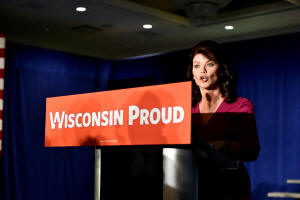Governors' races in 'blue wall' states carry high stakes for voting
rights
 Send a link to a friend
Send a link to a friend
 [February 18, 2022]
By James Oliphant [February 18, 2022]
By James Oliphant
WASHINGTON (Reuters) - Democrats are in
jeopardy of losing their long-time firewall against new voting
restrictions in Michigan, Pennsylvania and Wisconsin should Republicans
who support such curbs win competitive governors' races in those states
in November.
Republican victories in the three states could have profound
implications for the 2024 presidential election. Nicknamed the "blue
wall" after helping President Joe Biden defeat Donald Trump in 2020,
they also were home to challenges from Republican officials trying to
overturn the election's results.
Doug Mastriano, a state senator running for governor in Pennsylvania,
worked with Trump’s lawyers to challenge the 2020 outcome. James Craig,
a leading Republican gubernatorial candidate in Michigan, has called for
an audit of the election results.
Rebecca Kleefisch, the top Republican contender for Wisconsin’s
governor, filed a lawsuit seeking to prevent the use of drop boxes in
upcoming elections.
“They say every election is the most important of our lifetime. Well,
this one is,” said Kadida Kenner, executive director of the non-partisan
New Pennsylvania Project, a group that works to register new voters.

The governors' contests, like lower-ticket races involving everything
from secretaries of state to county clerks, have taken on increased
significance given Republican efforts to roll back voting rights and
oversee election administration ahead of 2024.
Since Trump's defeat, the three states' Republican-controlled
legislatures have been dedicated to passing limits on absentee and
mail-in voting, among other things. Democratic governors Tony Evers of
Wisconsin, Gretchen Whitmer of Michigan and Tom Wolf of Pennsylvania
stood in their way.
With Evers and Whitmer now facing tough re-election fights and Wolf
unable to run again due to term limits, voting rights advocates are
scrambling to warn voters of the stakes. Political analysts consider all
three races to be toss-ups.
A Democratic super PAC, American Bridge, said on Wednesday it would
spend $10 million in a new effort to target Republican candidates in
races for governor, secretary of state and other local offices who it
believes will undermine the fair administration of elections. The "blue
wall" states will be part of the push.
Kenner's group is advocating to keep the widespread mail-in voting
Pennsylvanians enjoyed during the pandemic, as well as seeking to
register 50,000 new voters this year.
A voting-rights group in Michigan, Voters Not Politicians, is recruiting
volunteers to go into their communities to argue that the election
system is not broken, that the 2020 election was free of fraud and that
the sweeping measures advocated by Republicans in the state aren't
necessary.
Election analysts say it may be difficult to craft a resonant
voting-rights message in a year where Americans likely are preoccupied
with other issues such as inflation and education.

"It really has to be articulated to the electorate that we are at
extraordinary time," said Rachel Bitecofer, co-founder of StrikePAC, a
Democratic voting-rights super PAC.
Her message to voters: "A Democratic governor is the only thing standing
between a free and fair 2024 election."
VOTING RIGHTS FIGHT
On Tuesday, days after launching a bid for Wisconsin's governorship,
Republican state Representative Timothy Ramthun staged a rally at the
state capitol that called for the 2020 election to be overturned. Some
in the crowd carried banners that said, "Trump Won."
[to top of second column]
|

Lieutenant Governor Rebecca Kleefisch announces that Republican
Governor Scott Walker's campaign is going to seek a recount in the
race for the governor of Wisconsin at a mid-term election night
party in Pewaukee, Wisconsin, U.S. November 7, 2018. REUTERS/Nick
Oxford/File Photo
 That evening, Evers, who analysts
say may be most at risk in the three governor's races, warned in an
address to the state that "we must not take for granted" the right
to vote.
Like other governors, Evers has dealt with a surfeit of challenges,
including the COVID-19 pandemic, economic upheaval, supply chain
woes, school closings and a spike in violent crime, all of which
have taken a toll on his popularity. Biden's sinking approval rating
has also become a drag on Democratic governors.
Last year, Evers vetoed a Republican package that included
provisions that would make it more difficult to cast absentee
ballots. Republicans in the state Senate last week introduced a new
version of the measure.
The lead sponsor, Senator Duey Stroebel, said the legislature's
review of the 2020 election justified the changes.
“These elections bills are necessary to fix loopholes, ambiguities
and weaknesses in Wisconsin’s election law,” said Stroebel, a
Republican. “It is highly unlikely these problems altered the
outcome of the 2020 election, but improved election procedures would
greatly increase public confidence in the results.”
The nominal favorite in the Republican primary for governor, former
lieutenant governor Kleefisch, recently asked the state Supreme
Court to invalidate the use of ballot drop boxes. Another
gubernatorial candidate, businessman Kevin Nicholson, has said they
are illegal.
In an environment where Democrats are vulnerable, analysts said too
tight a focus on claims of election irregularities could alienate
swing voters in the general election.
“This is something Republicans care about,” Jacob Rubashkin, an
analyst in Washington who tracks governor’s races. “This is not a
winning issue writ large.”
Pennsylvania's governor's race holds extra consequence for future
elections. The state's governor appoints the secretary of state, who
oversees election administration.

Attorney General Josh Shapiro is replacing Wolf on the Democratic
ticket. A poll conducted this month by the Trafalgar Group showed
former U.S. Representative Lou Barletta, an ardent Trump supporter,
leading the pack of more than a dozen Republican gubernatorial
candidates, followed by Mastriano.
After the November 2020 election, Mastriano convened what he called
a field hearing featuring Trump lawyer Rudy Giuliani to examine
whether there was widespread fraud. Later, he traveled to Washington
for the Jan. 6 rally and took part in protests outside the U.S
Capitol.
This week, the select congressional committee investigating the
Capitol siege subpoenaed Mastriano, asking for details about a plan
to submit an alternate slate of electors from his home state.
(Reporting by James Oliphant; Editing by Colleen Jenkins and
Alistair Bell)
[© 2022 Thomson Reuters. All rights
reserved.] This material may not be published,
broadcast, rewritten or redistributed.
Thompson Reuters is solely responsible for this content.
 |